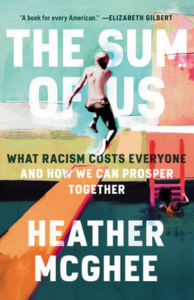As we head into the last few weeks of the term, we wanted to share what some of our colleagues from around campus are reading. Perhaps one of these will spark your interest or get added to your To Be Read list over winter break.
We asked colleagues, “What have you read that has informed your work or resonated for you, and why? This can be reading in any form (e.g., books, articles, videos, podcasts, audiobooks, etc.).”
Dan Larson, Vice Provost for Student Affairs
T he Sum of Us: What Racism Costs Everyone and How we can Prosper Together, by Heather McGhee.
he Sum of Us: What Racism Costs Everyone and How we can Prosper Together, by Heather McGhee.
While I am not yet finished with the book, I am finding the information and analysis to be helpful in understanding systems and how they perpetuate social and racial disparity.
How College Works by Daniel F. Chambliss and Christopher G. Takacs. This book provides an analysis of what about the college experience produces student success. It’s a Student Affairs anthem!
Scott Vignos, Interim Vice President and Chief Diversity Office, Office of Institutional Diversity
 I am a huge fan of the podcast “Throughline” from National Public Radio. Hosted by Ramtin Arablouei and Rund Abdelfatah, Throughline dives deep to illuminate connections between historical events and contemporary issues. I particularly love the episodes on voting rights in the United States, and James Baldwin’s enduring influence.
I am a huge fan of the podcast “Throughline” from National Public Radio. Hosted by Ramtin Arablouei and Rund Abdelfatah, Throughline dives deep to illuminate connections between historical events and contemporary issues. I particularly love the episodes on voting rights in the United States, and James Baldwin’s enduring influence.
Sarah Tinker Perrault, WIC Director & Associate Professor, WIC & School of Writing Literature, & Film
For my research, I’ve been reading about bibliometrics, that is, statistical methods of measuring scholarly output and impact. Two articles offer a good introduction to how bibliometrics affect scholars’ working conditions and work: “The Leiden Manifesto for Research Metrics” and the San Francisco Declaration on Research Assessment. These and other articles are informing the book I’m writing on rhetorical approaches to teaching science writing. To teach rhetorically, we need to convey the complex contextual factors that affect writers’ decisions; therefore, the book will help writing studies and science faculty understand how factors like bibliometrics shape scientific genre ecologies.
Daniel López-Cevallos, Assistant Vice Provost for Undergraduate Education & Associate Professor of Ethnic Studies, Academic Affairs
 This fall, my undergraduate research team (URSA, STEM Leaders) and I are reading the book “Relationship-Rich Education: How Human Connections Drive Success in College” by Peter Felten and Leo Lambert of Elon University. The book argues for the importance of centering human connections/relationships towards a transformative undergraduate educational experience; and propose four principles for advancing relationship-based learning: 1) Every student must experience genuine welcome and deep care; 2) Every student must be inspired to learn; 3) Every student must develop a web of significant relationships; and 4) Every student must explore questions of meaning and purpose.
This fall, my undergraduate research team (URSA, STEM Leaders) and I are reading the book “Relationship-Rich Education: How Human Connections Drive Success in College” by Peter Felten and Leo Lambert of Elon University. The book argues for the importance of centering human connections/relationships towards a transformative undergraduate educational experience; and propose four principles for advancing relationship-based learning: 1) Every student must experience genuine welcome and deep care; 2) Every student must be inspired to learn; 3) Every student must develop a web of significant relationships; and 4) Every student must explore questions of meaning and purpose.


